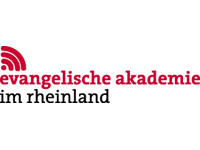
"Dialogue between Theology and Science"
at the Protestant Academy in the Rhineland
The Protestant Academy in the Rhineland advances protestant positions publicly and sustainably through contributions on contemporary issues in social discourse– using local cooperation events, contact with ecclesiastical and secular media and through background information and dialogue opportunities on our website.
Social, ethical and ecclesiastical issues are focussed
The Academy puts societal, ethical or church issues, for which there are still no definitive and formulated answers, at the centre of its work. It relates Christian key statements to the challenges facing society in general and the churches in particular today. With its contributions and events, the academy wants to enrich societal and ecclesial debates and thus participate in social change processes. Its subject-specific and public relations work serves this purpose, too.
The academy works in five subject areas
The Academy works in five thematic areas: science and ethics, politics, economics and social affairs, social cohesion and new media. It invites discussion and exchange of ideas in many places around the Protestant Church in the Rhineland. It addresses interested lay people as well as experts and disseminators, also different church and social groups and actors.
Temporary emphasis in focus areas
The Protestant voice is just one among many within the social debate. It is, however, able to distinguish itself through an open dialogic confrontation with other points of view. With its work focusing on five subject areas, the Academy is paying attention to this.
Main topic Science:
"Images of man, world views, images of God"
The main topic in the field of science and ethics is "Images of man, world views, images of God". This is about the variety of interpretative possibilities of reality. In doing so, the area builds on the dialogue between theology and the natural sciences, long-established at the Academy.
Concerning dialogue between theology and natural sciences
The natural sciences have been incredibly successful in recent centuries, but their view does not provide the whole picture of reality. Here, a biblical tradition calling itself theology is challenged to provide a contribution of its own.
Nothing has shown itself as powerful and consequential for our culture, which derives from the Christian Occident, as the natural sciences. They have developed continuously since the 17th century. Our handling and orientation in the world today require technics, which applies both to the work processes as to the everyday world as well. The techniques permeate our communication behaviour as well as fundamental issues of life at turning points such as birth, illness, old age and death.
Options for action extended by science and technology require ethical reflection
The changes in our world due to the increasing human ability to cognise and the enhanced possibilities of human design deeply influence our actions and our self-image.
The options for action, expanded through science and technology, constantly confront us with new moral problems. By what rules should one deal with the new knowledge, with what standards moral judgments in modern society can be made? Examples of ethical reflection requirements abound, such as in dealing with nuclear energy, biotechnologies, energy use and pollution, intensive care and electronic media. After all, there is also a need for ethical reflection of the sciences themselves: today, it is part of the standard of scientific theory to recognize the dependence of scientific research on social currents and cultural presuppositions. This naturally raises the question of research ethics.
The scientific world view influences our image of the world and our image of God
With the new science-based insights, our self-image, our image of the world, of reality, and finally our image of God is changing. Our "Weltanschauung" is not independent of the scientific and technical experience. This not only applies to data and facts, but also applies to our mission statements: Without the experience of the astronauts and the images they made, the image of the "blue planet Earth" could never have become so strong and formative. Further examples of the influence are the human image characterized by neurobiology and genetic engineering, the unity of physical theories of cosmology, the influence of electronic media on our understanding of time and the world.
Dialogue between Theology and Science is an essential element in the field of "Science and Ethics" at the Academy
The dialogue between science and theology has been conducted in the Anglo-American countries for many years and is already institutionalized there. Increasingly, it is now gaining in weight and popularity with us. It has become clear that this dialogue is a necessary basis for the self-understanding of Christian theology in the 21st century.
At the Protestant Academy in the Rhineland, this dialogue has been a central element of the work area "Science and Ethics" for more than 15 years. These include questions like: How can we find solutions to the ethical problems that confront us with the new options for action made possible by scientific and technological progress? What influence do the scientific findings have on our self-image, on our Christian faith, on the questions of the human in the world?
Dr. Frank Vogelsang
Bonn, July 2019
